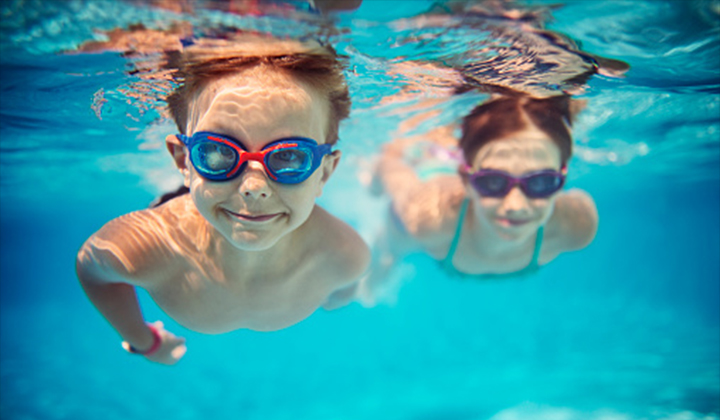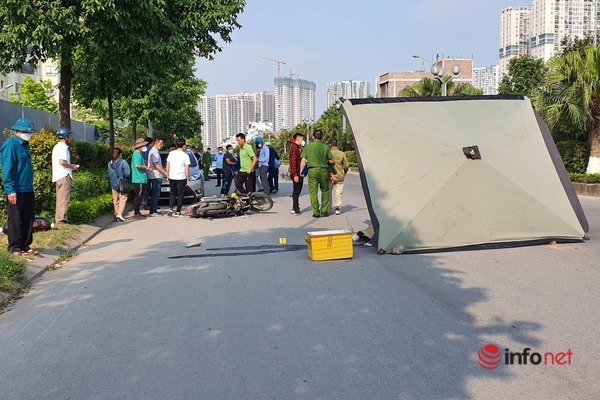Going swimming during the hand, foot and mouth disease season, what should children pay attention to?
1. Hand, foot and mouth disease spreads easily in which environment?
Community factors such as children attending kindergartens and kindergartens are risk factors for the transmission of HFMD, especially during outbreaks.
Hand, foot and mouth disease is highly contagious and is transmitted directly from person to person through the mouth, through secretions from the nose, mouth, feces or saliva of sick children.
Infected people are capable of shedding the disease-causing virus during the first week – the incubation period. However, the infectious period can last for several weeks because the virus is still present in the stool and saliva of the patient. Therefore, if children go swimming, there is a very high chance of infection if there are pathogens.
The disease is usually transmitted when children come into direct contact with infected people such as:
- Inhaling, swallowing secretions, saliva of sick people when eating together, coughing, sneezing, talking;
- Direct contact with the fluid of blisters, blisters, feces of the patient;
- The healthy child holds the toys and touches the objects of the sick child; Spread through the hands of the caregiver…

The virus causes hand, foot and mouth disease.
2. How to let children go swimming for safety?
The swimming pool is a place where children gather in high density, so the risk of infection is high. The virus that causes hand, foot and mouth disease can infect the water and then enter the healthy child’s mouth and nose and cause illness.
The swimming pool environment is also easy to spread a number of other infectious diseases such as meningococcal disease, trachoma, especially skin diseases: When swimming, the body is easily touched and lightly scratched. This is a very good condition for viruses, molds, skin diseases… to invade and attack the body.
Fungal diseases are also common with ringworm, nail fungus, hair fungus, tinea versicolor. Patients often present with symptoms of itching, ulcers at the lesion sites. Antiseptics in water cause allergic contact dermatitis, which is characterized by dry and flaky skin.
Therefore, when taking children to swim, it is difficult to avoid the above diseases if the density of swimmers is too high… Or in the case of crowded swimming pools, close contact with infectious sources such as: Sharing swimming buoys, tables and chairs, houses, etc. hygiene… also increases the possibility of infection.
The best way to prevent hand, foot and mouth disease and other infectious diseases during the epidemic season, is:
- Parents should refrain from bringing their children to places where there are too many people and there is a high risk of illness. Care should be taken when allowing children to participate in crowded activities such as swimming pools, public playgrounds…
- Children should not be allowed to swim when they are unwell or have recovered from illness.
Do not use shared objects such as life jackets, swimming suits, tables and chairs, toilets, etc. because it can increase the possibility of infection.
- For healthy children who go swimming, it is necessary to remind them to wear glasses, hats, swimwear and do not take off glasses in the pool many times to avoid bacteria entering the eyes. While swimming, it is necessary to avoid choking on water and limit water entering the ears, nose, and throat.
- After swimming, you should rinse your mouth with physiological saline and wash your eyes and ears with appropriate antiseptic solutions to prevent infectious diseases.
- In addition, parents need to choose a pool that is safe in terms of water quality. Do not swim in a place with too many people, or swim where the water has not been changed or disinfected for a long time.
- Absolutely do not let children go swimming when they have skin diseases or when their physical condition is weak. Before swimming, do not eat too much and drink enough water.

Young children who go swimming are at risk of hand foot and mouth infection during the epidemic season.
3. General principles to prevent hand, foot and mouth disease for children
– It is necessary to clean the place of residence, clean the classroom environment such as cleaning the floor, cleaning tables and chairs, children’s toys, etc. with common detergents.
– Need to guide children to practice good personal hygiene; oral hygiene, wash hands thoroughly before and after eating, before and after going to the toilet.
– Do not let children put their hands or foreign objects in their mouths.
– Eat cooked food and drink boiling water to limit diseases transmitted by the fecal-oral route, including hand, foot and mouth disease.
– Limit going to public and crowded areas to avoid getting sick. When you have symptoms of hand, foot and mouth disease, you need to see a doctor as soon as possible.
BS. Hoang Viet Ha (suckhoedoisong.vn)
at Blogtuan.info – Source: danviet.vn – Read the original article here



